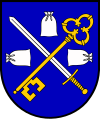Pieniężno
| Pieniężno | |||
|---|---|---|---|
 |
|||
|
|||
| Coordinates: 54°13′N 20°7′E / 54.217°N 20.117°E | |||
| Country |
|
||
| Voivodeship | Warmian-Masurian | ||
| County | Braniewo | ||
| Gmina | Pieniężno | ||
| Area | |||
| • Total | 3.83 km2 (1.48 sq mi) | ||
| Population (2006) | |||
| • Total | 2,915 | ||
| • Density | 760/km2 (2,000/sq mi) | ||
| Postal code | 14-520 | ||
| Website | http://www.pieniezno.pl | ||
Pieniężno [pʲɛˈɲɛ̃ʐnɔ] (German: ![]() Mehlsack ) is a town on the Wałsza River in the Voivodeship of Poland. It is located in Braniewo County and had a population of 2,975 in 2004.
Mehlsack ) is a town on the Wałsza River in the Voivodeship of Poland. It is located in Braniewo County and had a population of 2,975 in 2004.
During the Middle Ages, an Old Prussian fort called Malcekuke, loosely translated as "woods of the subterraneous" or "devil's ground", was located near the current site of Pieniężno. This was linguistically corrupted by German settlers to Mehlsack, meaning "flour sack", and then by Poles to Melzak. In the 14th century it was founded as a town west of Heilsberg (Lidzbark Warmiński) in Warmia.
The town's coat of arms depicts three bags of flour spaced in between a golden sword and a silver key, all on a blue background. The website recalls a story that the inhabitants defied a Swedish siege in the 17th century by spilling their last sack of flour as a deception to convince them that they still had plenty of food left.
The Teutonic Knights built an Ordensburg castle near Malcekuke in 1302. Both the castle and the town which developed nearby were destroyed during warfare between the Teutonic Order and the Kingdom of Poland in 1414. During the Thirteen Years' War, Mehlsack surrendered to the Order, and the castle burned down during Poland's recapture of the town. Nicolaus Copernicus was an administrator for the districts of Allenstein (Olsztyn) and Mehlsack for a few years in the early 16th century. From October 1518 - March 1519 Copernicus was based out of the castle while he settled nearby villages. From 1589-1599, Prince Andrew Cardinal Báthory of Transylvania, cousin of Sigismund Báthory, was the administrator for the castle. In 1550, the Prussian army laid siege to the city and partially burned it down.[1]
...
Wikipedia



